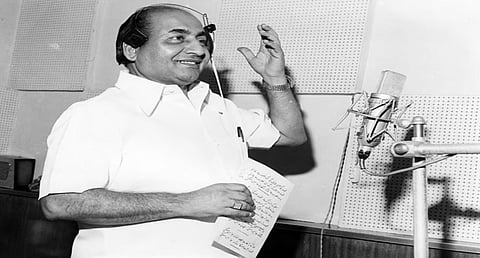
- Home
- Live Blog
- Breaking News
- Top Headlines
- Cities
- NE News
- Sentinel Media
- Sports
- Education
- Jobs

Gautam Ganguly
(gautamganguly2012@gmail.com)
Music aficionados gear up to celebrate legend Mhd. Rafi on his centenary birth anniversary on 24th December. Sonu Nigam, an unabashed admirer of Mhd. Rafi, had stated categorically, in one of his interviews, that ‘Mohammad Rafi’ is the greatest singer India can ever produce in the world of playback singing.’ Sonu further added, ‘The experts on music have a very tough time judging the best performance of Rafi, whether his ghazals are the best, or his songs with an intoxicated atmosphere, or whether his pure classical numbers.’ Another celebrity, S. P. Balasubrahmanyam, having sung more than forty thousand songs with six National Awards in his kitty, called ‘Mhd Rafi’ his ‘Guru.’ Sunidhi Chouhan and Shreya Ghosal have paid flowing tributes, waxing eloquently about Rafi’s influence on their musical careers.
Views expressed by these celebrities drive home the extent of Rafi’s musical influence on the connoisseurs of Bollywood songs, besides enticing singers of repute cutting across generations irrespective of sex, region, caste, and language.
A casual look at the musical scenario familiarises us with the fascinating fact that Mhd. Rafi’s popularity, even after four decades of his passing away, is soaring despite radical transformation in taste, technology, and culture. Statistics reveal that Mhd. Rafi remains the most heard ‘Indian singer on the internet.’ To put on record that Rafi sang nearly 4,500 mind-blowing songs, a record of sorts. Rafi’s popularity transcends artificial human barriers, and his birth and death anniversaries are celebrated across the world.
Rafi’s tonal quality and ability to sing any type of song melodiously exercise endearing appeal to music lovers. Romantic, tragic, patriotic, Hindu devotional songs, etc., Rafi excels in all genres, and his soulful singing touches the minds and hearts of music lovers. To quote O.P. Nayyar, the emperor of rhythm, ‘sheer versatility, perfect emoting, sublime voice, and marvellous octave range led to marginalising a number of male singers of that era. And O.P.N told without mincing words that ‘if there was no Rafi, there would be no O.P. Nayyar.’ A singer of the stature of Mukesh once remarked jokingly that if Rafi stopped recording songs, singers like him would get a chance to sing.!!!
Analysing some of the all-time hit songs will throw light on the mesmerizing singing skill and ability of the maestro. ‘Deewana hua badal’ from ‘Kashmir ki Kali,’ ‘Tere mere sapne(Guide), ‘Pukarta chala hoon (Mere Sanam), ‘Likhe jo khat tumhe,(Kanyadan), ‘Mast baharon ka mei asique,(Farz), ‘Aye dil hai muskil’ ( CID) ‘Jo wada kiya. (Taj Mahal), etc., are some of the best romantic songs. The same voice has sung tragic songs like ‘Yaade na jaye, beete dino ki, (dil ek mandir), Tute hue khawabon ne’ (Madhumati), etc., with remarkable poise. ‘Kar chalein hum fida(Haqeeqat) is the quintessential patriotic song evoking tears from the admirers. There are many other patriotic songs sung by the mellifluous singer. ‘Hum kale hai to kya hua’ is another masterpiece, an evergreen song. Rafi’s repertoire adds further: ‘Sufi Qawwalis, Shabad Gurbani, Ghazals,’ and one feels the canvas of Rafi is as tall and vast as that of the Himalaya.
Rafi ji was a pious man. Never drank in his life. But when one listens to the immensely popular song, ‘Choo lene do najuk hoto’ (Kajal), one is astounded by his rendition as a drunken man. ‘Sonu Nigam, astonished by Rafi’s ability to get immersed in the song, has called him a ‘genius and a trendsetter.’. . ‘Those days there was no ‘YouTube.’. No one taught Rafi how to sing as a drunken man. It was his own innovation, Nigam added.
There are a number of ‘websites’ dedicated to Mhd. Rafi and these are almost like shrines where every article written on him is reverentially posted. ‘MOHAMMAD RAFI THE GREAT SINGER FANS CLUB, Indore, is one such burgeoning group with 53.1k members from various parts of the world paying tributes regularly with articles besides echoing the campaign vociferously for awarding him, BHARAT RATNA,’ posthumously.
The maestro Dr. Bhpen Hazarika had initiated Rafi in the movie, ’Lati Ghati,’ to sing a ‘QWAALI’ magnifying communal harmony in Assam. Thereafter, Rafi sang four more songs. ‘ASOMEERE CHOTALATE, RADALIRE CHENEHATE’ remains one of the popular songs.
The Padma Shri, Mohammed Rafi Chowk, in the Bandra suburb of Mumbai and Pune (extending MG Road) is named after Rafi.
Born on 24th December, 1924, Rafi’s death on 31st July 1980, at just 55 years, dealt a big blow to Hindi Cinema and left his fans grieving for years. In 2001, Rafi was honoured with the “Best Singer of the Millennium” title by Hero Honda and Stardust magazine. In 2013, Rafi was voted for the Greatest Voice in Hindi Cinema in the CNN-IBN poll.
Everyone from Lata Mangeskar, Dilip Kumar, and Meena Kumari to Rishi Kapoor, etc., called him the “Voice of God.” Unlike any other recorded human voice, male or female, “Rafi was endowed with an incredible texture, finesse, and range that are akin to marvels of nature.”